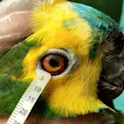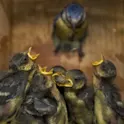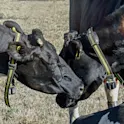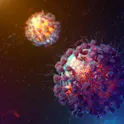
Life sciences
19 Aug 2020
Microbial ecology yields new insights for future shipwreck conservation
Shipwreck habors a rich spatially structured microbial community: Frontiers in Microbiology

Life sciences
19 Aug 2020
Shipwreck habors a rich spatially structured microbial community: Frontiers in Microbiology

Health
13 Aug 2020
Reptile and bird tears are remarkably similar to human tears: Frontiers in Veterinary Science

Health
11 Aug 2020
How should you reopen your business after Covid19 lockdown? Frontiers in Applied Mathematics and Statistics

Life sciences
05 Aug 2020
By Nora Belblidia, science writer Researchers in Spain have examined bird nests in order to understand how flying insects and parasites detect gases as a way to locate their hosts. The study found that nests that had higher concentrations of carbon dioxide attracted more biting midges, a type of insect that carries a common blood parasite that infects local birds. The findings have implications regarding how diseases spread, which will be affected as carbon levels rise due to climate change. Flying insects and parasites are often vectors for disease, but a mosquito needs to first find someone before they can bite them. In a recent study published in Frontiers in Ecology and Evolution, researchers examined bird nests in order to understand how insects and parasites detect gases such as carbon dioxide and methane as a way to locate their hosts. The researchers focused on blue tit bird nest boxes located in a deciduous forest in central Spain. They found that the nests contained more biting midges when concentrations of carbon dioxide were higher inside the nest compared to the forest air. “This is important because biting midges are the main vector of Haemoproteus, the most abundant blood parasite infecting birds […]

Life sciences
05 Aug 2020
High levels of anthropogenic toxins found in stranded cetaceans: Frontiers in Marine Science

Health
04 Aug 2020
Penis microbiota important for development of bacterial vaginosis: Frontiers in Cellular and Infection Microbiology

Life sciences
04 Aug 2020
Social behavior of cows: Frontiers in Veterinary Science

Health
27 Jul 2020
By Carolyn E. Unck | KAUST Discovery A likeness between genes of the SARS and COVID-19 viruses could inform research into potential treatments Understanding any similarities between SARS and COVID-19 inflammation could help in a clinical setting. A protein in the viruses causing COVID-19 and SARS is almost identical. Researchers propose testing if targeting COVID-19 with FDA-approved drugs, already tested in mice infected with SARS, could improve the outcomes for COVID-19 patients experiencing severe respiratory symptoms. The finding was a collaborative effort from teams at KAUST following a comparison of Betacoronavirus genomes. “We have long-standing expertise in analyzing genomic data at KAUST’s Computational Bioscience Research Center,” says molecular biologist, Takashi Gojobori. Gojobori, Carlos M. Duarte and a team of scientists compared the genomes of 24 Betacoronaviruses, including four SARS-CoV-2 viruses, which causes COVID-19. Two of the four were sequenced in the United States, while the other two were sequenced in China. “SARS-CoV-2 appears to have recently evolved from other related Betacoronaviruses, such as the ones causing SARS and Middle East respiratory syndrome (MERS),” explains Intikhab Alam, first author of the study. “We wanted to understand the genetic make up of SARS-CoV-2. Seeing what has changed might help find ways to detect the virus and understand its […]

Psychology
25 Jun 2020
Couples that spend the night in the same bed show increased REM sleep and synchronization of sleep architecture: Frontiers in Psychiatry

Health
24 Jun 2020
Reducing high pulse pressure could be a promising new prevention for dementia: Frontiers in Neuroscience

Humanities
19 Jun 2020
Maternal mental health linked to increased risks for both moms and babies, but physical exercise may help: Frontiers in Global Women’s Health

Humanities
17 Jun 2020
After March, disproportionately more cases occurred in richer counties while poorer areas had higher death rates: Frontiers in Sociology

Humanities
12 Jun 2020
Pandemic allows researchers to analyze how websites like Facebook can influence dynamics between different social groups: Frontiers in Communication

Health
10 Jun 2020
Model shows that ending lockdown in two steps is optimal, while suddenly releasing everyone is a high-risk strategy: Frontiers in Public Health

Health
05 Jun 2020
Lockdown succeeded in reducing transmission, but existing cases and lack of herd immunity means the risk of a second wave is high: Frontiers in Medicine
Get the latest research updates, subscribe to our newsletter